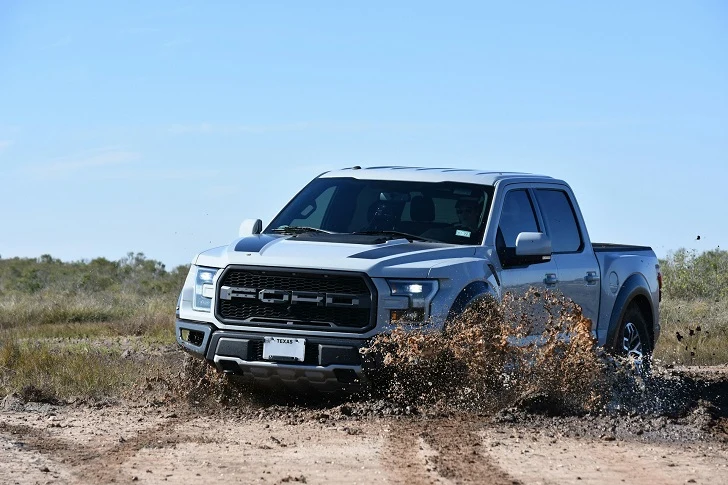Before embarking on an adventure, you may be faced with a crucial decision between using a pickup truck or something different to explore the wilderness. Enthusiasts often debate the merits of various four-wheelers when making this choice. If you are in a similar predicament, understanding the pros and cons of pickup trucks can be tremendously helpful.
Pickup trucks have long been revered for their versatility, ruggedness, and hauling capabilities, making them a top choice for off-road enthusiasts seeking adrenaline-fueled escapades. However, their size, stock suspension, and price point may deter some aficionados.
This article will explore the aspects of using a pickup truck for off-roading. So, buckle up and continue reading—I am confident you will have a clearer idea of whether or not this four-wheeler will suit your off-roading needs by the end of this guide.

Which Pickup Is Best Off-Road?
Choosing the ideal off-roading vehicle amidst a vast market can be daunting. As technology advances, automakers continuously introduce newer and better options. The venerable Jeep fleet leads the charge for these fantastic vehicles, followed by the equally reputable Land Rover, Ford Raptor, and Toyota Hilux, among others.
While these examples include SUVs and pickup trucks, more enthusiasts are leaning towards the latter, with payload capacity and utility topping their considerations. While these features are not unique to pickup trucks, they are better known for them, giving them the upper hand.
Not everyone would agree with this sentiment — and for good reason. Thanks to lavish trims and aftermarket mods, many SUVs can match (if not exceed) the specs of pickup trucks in these areas. You are halfway through solving your off-roading dilemma by choosing either four-wheeler. However, you still have to decide which pickup is best off-road.
To help you do just that, the subsequent section will highlight key off-roading requisites while evaluating pickup trucks’ performance against each one of them.
Pickup Trucks: Pros and Cons
Safety
Picture this: you are cruising down a rocky trail, bouncing over boulders and splashing through mud puddles. In this scenario, having a tough pickup truck underneath you can be a game-changer. Of course, driving a pickup is not necessarily the only thing that can, but it means you can push the limits of off-road adventure without messing up your ride.
Many pickup trucks boast safety features such as factory bumpers (view on Amazon), ABS, traction control, and airbags, crucial when things get dicey. Most models have a solid rear windshield and sturdy glass windows, shielding drivers from obstacles.
So, while safety may not be the main selling point of pickups, opting for this vehicle can enhance your adventures, making them more enjoyable and stress-free.
On-Road Capabilities
When heading to your off-road spot, you have to tackle highways and interstates first, right? This is where a pickup truck shines. These bad boys have been hauling heavy loads and tackling yard work for decades. So, when it is time to hit the trails, they are ready to go from smooth pavement to rock-strewn paths without breaking a sweat — like an all-purpose tool in your off-roading toolbox.
If anything, the only foreseeable challenge pickup trucks may have is that their heft may not do so well in narrow urban streets. But then again, these are not the usual types of roads that lead to off-roading destinations.
Towing and Hauling Ability
Pickup trucks are built for heavy-duty hauling and yard work, boasting bigger towing and load capacities than ATVs, UTVs, or Jeeps. They’re the go-to choice when you need some serious lifting power. However, whether you need that extra cargo space or power depends on your choice of recreational activity and the sticky situations you might encounter.
Versatility
Regarding versatility, the context varies based on the specific type of off-roading you engage in. I have discussed the subsets in detail in my “What Is Off-Roading” guide.
Of these activities, a pickup truck has proven to be ideal for green laning, winter off-roading, and overlanding. This is primarily attributed to the vehicle’s roominess, which lends to its convertibility from a weekend warrior to a cozy abode in the wilderness.
This is not to say that your pickup truck is unsuitable for other off-roading adventures. However, specific nuances in these different activities may not align with the four-wheeler’s functionality.
Upgradability
There are many ways to customize your pickup truck, from adding soft tops and upgrading to new lights to jazzing it up with graphics and electroplating. You might not need all these extras if you have a specialized off-roading trim. But if you have a preloved pickup, you are in luck, especially if your model has lots of aftermarket support.
Installing a snorkel kit (view on Amazon) is a popular mod to exceed these vehicles’ standard 800mm wading depth and reduce the chances of alternator damage. On the other hand, getting the perfect clearance and angles entails swapping out for bigger tires or lifting the suspension.
You might even need to replace your stock rails and bumpers for ones better suited to off-roading. It is a bit of extra work and money, but the unbeatable performance on the trails would be worth every hard-earned penny spent.
Conveniences
You may think that riding in a vehicle with just a cup holder and a 12V auxiliary outlet is all you need, but you will understand the need for more creature comforts when you are out on the trails for hours. Many drivers go the extra mile to make their rigs as cozy as possible.
Thankfully, you do not need to fuss with complicated mods for a comfy ride anymore. Modern pickup trucks come loaded with all the bells and whistles you need for a full day of off-roading fun. Think premium speakers, comfortable seats, and even hidden coolers to keep you refreshed. And if that does not suffice, the aftermarket scene has your back for any extra upgrades you might want.
Now, let’s look at the facets of a pickup truck that need to be taken with a grain of salt.
Fuel Efficiency
Regarding the fuel efficiency of an off-roading pickup truck, opinions often diverge like tire tracks in mud. Some see it as a potential drawback during long-distance adventures, while others consider it a necessary trade-off for this four-wheeled beast’s power and capability.
Opinions aside, what is certain is that rugged terrain and constant gear-shifting can guzzle gas. These factors are a given in off-roading and can lead to frequent stops at the pump, potentially limiting the range of your travels. In remote areas with fewer gas stations, more stops means less time tearing up the trails.
Size and Heft
Heft can be a good thing in many ways. It enables a pickup truck to provide added protection and insulation against outdoor elements. For instance, the enhanced utility and space for an overlanding setup compensate for the added length caused by having a cargo bed. However, heft may impede the 4×4’s agility in challenging terrain, compromising maneuverability and performance in adverse conditions.
With size comes navigation and parking problems, too. Although pickups are not as huge as Class 1/2 trucks, they are still massive compared to a compact SUV or smaller ORV. This could be an issue when frequenting trails with staging areas (designated or otherwise) or lots of tight switchbacks like Hell’s Revenge in Utah or Calico Ghost Town in California.
It depends on the amenities and specific layout of each off-road park. But just to be safe, schedule your rides outside of Saturdays, peak tourist seasons, or special off-road events as much as possible. Otherwise, even the above destinations may not be able to accommodate you and your 4×4.
Stock Suspension
Pickup trucks have the upper hand in payload capacity — all thanks to leaf springs. Not all models have this as their stock configuration, but the good ones do. Leaf springs like Dorman 43-701HD Rear Leaf Springs (view on Amazon) do not compress as much as coil springs, enabling them to carry more weight.
The downside is that they do not give the pickup as much wheel travel as an owner would like. Their simpler design also means that leaf springs may sit lower in the suspension, resulting in less ground clearance. In contrast, coil springs can be positioned higher within the suspension system, potentially offering higher ground clearance (albeit at the expense of an inferior load-bearing capacity).
You always have the option to modify the pickup truck’s stock suspension system. In addition to the existing leaf spring setup, this conversion may involve replacing shock absorbers, control arms, and mounting brackets. The task is typically outsourced to a professional mechanic unless you have advanced mechanical skills and are savvy enough to perform it yourself.
Wheelbase
Having a longer wheelbase on your pickup truck can be a mixed bag. On the one hand, it can give you better stability on straightaways and make cruising on highways a breeze. But when you are off-pavement, that longer wheelbase can be a hindrance.
You might struggle to navigate tight spots or obstacles like rocks and trees. So, while a longer wheelbase might have its perks, it is something to consider when hitting the trails more frequently.
Price Point
Finally, let us discuss the price tag for off-roading in a pickup truck.
Some folks might see the higher price of a pickup as a drawback. They tend to be a bit pricier upfront, masking the fact that not only are they a trusted buddy but also an investment in your off-roading adventures. While the price might seem steep initially, it is all about what you get for your buck in the long run.
With a pickup, you get serious hauling power and rugged durability, which can pay off big time when tackling challenging or technical terrain. Not to mention that pickups tend to hold their value pretty well. If you ever decide to sell or trade up, you will likely get a good chunk of your money back.
Conclusion — Are Pickup Trucks Good for Off-Roading? (Pros & Cons)
With the highs and lows discussed in this guide, you should be able to determine whether to go for that ‘pickup truck upgrade’ you have been planning for a while now or veer your prospecting elsewhere. Ultimately, your decision will hinge on your answer to the question: “Why do you need a pickup truck in the first place?” — in addition to personal preferences and the extent of your off-roading adventures.
But if you are not quite sold on the ‘extreme off-roading pickup truck’ concept yet, check out my post on Jeep vs. Truck for Off-Roading: Which Is Better to see if you resonate more with an SUV.
Kris is an avid off-roader and outdoor enthusiast who loves to brave the elements and take on challenging terrain. He also enjoys sharing his passion and knowledge with others so that they, too, can appreciate the ride.
About Kris
